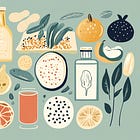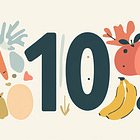The Dirty Dozen & Clean Fifteen 2024
Hidden Chemicals: 12 Contaminated Foods—15 You Can Trust
Every year, the Environmental Working Group (EWG) ranks fruits and vegetables based on pesticide contamination.
Here’s a quick guide to last year’s lists to help you make safer choices at the grocery store.
Break free from misinformation with science-backed insights, practical health tips, the latest research, and expert myth-busting—all from a Medical Doctor.
🚨 The Dirty Dozen: Most Contaminated Produce
These 12 items were found to have the highest levels of pesticides.
Whenever possible, opt for organic versions. However, when buying fully organic produce isn’t an option, remember to wash fruits and vegetables thoroughly to help reduce pesticide residues.
Strawberries
Spinach
Kale, collard & mustard greens
Grapes
Peaches
Pears
Nectarines
Apples
Bell and hot peppers
Cherries
Blueberries
Green beans
🌟 The Clean Fifteen: Lowest Pesticide Levels
These fruits and veggies are safer choices, even when conventionally grown:
Carrots
Sweet potatoes
Mangoes
Mushrooms
Watermelon
Cabbage
Kiwi
Honeydew melon
Asparagus
Sweet peas (frozen)
Papaya (check for GMO labeling)
Onions
Pineapple
Sweet corn (check for GMO labeling)
Avocados
Curious to see how the list might change in 2025—any predictions on which foods could move up or down?
To your zenith within,
Sara Redondo, MD
P.S. If your health is a priority, you need to read these posts.
P.S.2 You can join here my 10-Day Science-Based Nutrition Course to Transform Your Health











difficult to know when we have so little transparency regarding where the food we eat is grown
In exploring the "Dirty Dozen" and "Clean Fifteen," we are gently reminded of the sacred dialogue between body and Earth — a living conversation of nourishment, discernment, and trust. Each choice we make carries the subtle resonance of stewardship, not just for ourselves but for the intricate ecosystems that sustain life. This list is more than guidance; it is a compass pointing us back to the rhythms of conscious reciprocity and embodied care.
Amidst the complexity of modern consumption, this knowledge offers a quiet empowerment — a way to walk the marketplace as mindful pilgrims, honoring the sacred relationship between seed, soil, and spirit. What small choices today might ripple outward into greater wholeness tomorrow? ♾️